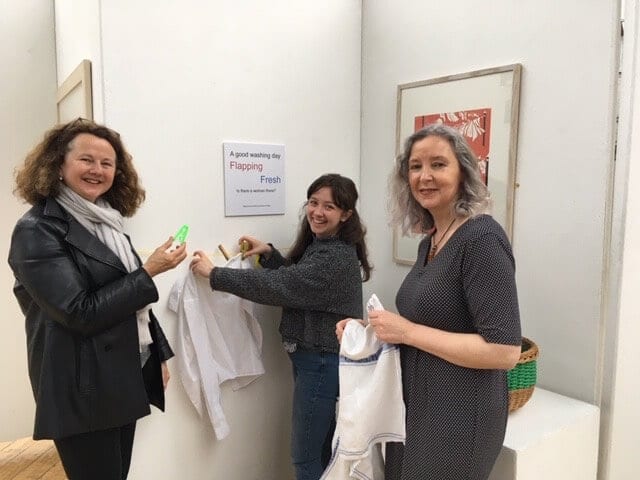Encounters – Flourishing with Art
On Thursday I caught up with some of Bold’s creative partners at the launch of Encounters – flourishing with art, a new book created with and for persons living with dementia by Art in Healthcare. The launch was part of the 2019 Luminate Festival of Creative Ageing, which ran throughout May with events extending the length and breadth of Scotland. Encounters was just one of many dementia inclusive events in this year’s festival. This event was such a lovely illustration of what our creative partners are capable of that I thought I should write about it and what creative partnering means for Bold.
Bold contends that everyone should be able to flourish throughout their lives. Our approach focuses on creating the conditions for all persons to flourish, as both a process (way of working) and as an outcome (each person’s experience). Flourishing with art sits at the very heart of our efforts. We’ll be using art-based methods in our work for several reasons. Perhaps most obviously, they can encourage imagination, creativity and innovation. This can open up different ways of seeing the world, de-familiarising the ordinary and taken for granted and drawing attention to contradictions, unfairness and even some of the cruelties buried in everyday life and in society as a whole. It can help people to see that there are other, better, possibilities.
Arts-based methods also provide different ways of sharing experiences, making it fun and enjoyable for all. They can challenge some of the bleak and solely negative assumptions about life with dementia, and can also deliver laughter, friendship and support to help people deal with any anxiety, fear, confusion or sadness that their situations may bring. This in turn can help build personal resilience and inject more playfulness and energy into the things people do. As a result, people may feel more able to take these methods back to their own homes, communities and workplaces, increasing confidence in using creativity as a tool for building trusting and meaningful relationships. Importantly, arts-based methods extend opportunities for the continued expression and involvement of persons with dementia should words become harder to find, building observational and non-verbal communication skills in novel ways and increasing confidence in their use. Finally, arts-based methods can generate provocative outputs that stop observers in their tracks and offer innovative and compelling ways to celebrate achievements and showcase them to others, such as through the series of events and annual exhibitions that Bold will hold.
Given the importance bold attaches to flourishing with art, we are fortunate to be collaborating with partner organisations and individuals with particular expertise in using different art forms in dementia inclusive ways, such as Luminate, Art in Healthcare, Magdalena Schamberger, pictured in the featured photograph. In this blog I’m focusing on Art in Healthcare, whose mission is to humanise and transform medical and healthcare environments across Scotland. Initially this transformation mostly took the form of building an art collection from which pieces could be lent for display. As the art collection continues to grow, with installations in new locations across Scotland, Art in Healthcare is challenging assumptions about the sort of artwork that should be displayed in healthcare settings, moving away from conventional and rather safe paintings to include more abstract and provocative works. Diversifying the collection has extended the possibilities for using art to explore personal creativity – something at the core of Art in Healthcare’s ‘Room for Art’ workshops. The workshops and art exhibitions serve to maximise the health and wellbeing benefits of engaging with art. As Art in Healthcare’s activities have diversified, they have also developed expertise in working in dementia-inclusive ways. Encounters is the culmination of these developments.
Encounters is a unique resource, in essence a portable art exhibition. The book has been designed through a process of experimentation, working with persons living with dementia over time to discover personal preferences and responses to different images. Guided by professional artist Heather Lucchesi, Director of the social enterprise Light Bulb Arts, Encounters has involved the careful selection of 20 images which, together with accompanying prompt questions to which there is no right (or wrong) answer. The images and the questions can evoke memories, but importantly they don’t have to. They have the potential to stimulate conversation, spark the imagination and provide a focus for conversation and being creative.

Many of the images that feature in Encounters were on display at the launch, together with accompanying exhibits. The above photograph was taken in front of one exhibit – an image called ‘Neighbourhood Watch’ by Edwina Jill Wilkie, together with a washing basket, clothes peg and line, the caption ‘A good washing day’. Pictured in the photograph from right to left are Anne O’Connor, Chief Executive of Art in Healthcare, Rebecca Leary, Festival Marketing and Programme Officer at Luminate, Scotland’s Creative Ageing Organisation and independent creative collaborator, Madgalena Schamberger, who was taking a short break from the tour of her latest theatre production, Curious Shoes – a joyful performance that provides an opportunity for persons living with dementia to see a high quality piece of theatre without it being a worrying or stressful experience for them.
These collaborators are all using art in highly innovative and dementia inclusive ways – offering persons living with dementia chances to be creative, to be seen and to be heard. In so doing, each is challenging perceptions of what persons, including persons living with advanced dementia, can do. I look forward to further encounters with our bold creative partners, to working with and learning from them and ultimately, to flourishing with art.
